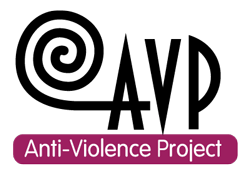Reproductive Justice
At the Anti-Violence Project, we understand that reproductive justice for people of all genders must be part of our struggle to dismantle gender-based violence and intersecting forms of oppression. Below is some information from Sister Song: Women of Colour Reproductive Justice Collective and Land Body Defence (an initiative by Women’s Earth Alliance (WEA) and Native Youth Sexual Health Network (NYSHN) ) that has helped us learn about the history of this framework and it’s connections to our work.
Defining Reproductive Justice:
- “The human right to maintain personal bodily autonomy, have children, not have children, and parent the children we have in safe and sustainable communities” – Sister Song
- “The right to have children or not, and to parent the children we have in safe and healthy environments. It is based on the human right to make personal decisions about one’s life, and the obligation of government and society to ensure that the conditions are suitable for implementing one’s decisions” – Land Body Defense
On their website, Sister Song describes the development of the reproductive justice framework:
“Indigenous women, women of color, and trans* people have always fought for Reproductive Justice, but the term was invented in 1994. Right before attending the International Conference on Population and Development in Cairo, where the entire world agreed that the individual right to plan your own family must be central to global development, a group of black women gathered in Chicago in June of 1994. They recognized that the women’s rights movement, led by and representing middle class and wealthy white women, could not defend the needs of women of color and other marginalized women and trans* people. We needed to lead our own national movement to uplift the needs of the most marginalized women, families, and communities. These women named themselves Women of African Descent for Reproductive Justice, and RJ was born. Rooted in the internationally-accepted human rights framework created by the United Nations, Reproductive Justice combines reproductive rights and social justice…”
Also, be sure to check out the report and tool kit created by Land Body Defence called Violence on the Land, Violence on our Bodies: Building an Indigenous Response to Environmental Violence. These documents are filled with information and activities for thinking about the connections between the violence of extractive industries on Indigenous people’s land and violence against Indigenous people’s bodies and communities. They write about sexual and reproductive justice, saying:
“As the legacy of Indigenous and women of color community organizing has taught us, it’s critical to recognize the interrelatedness of issues about and surrounding our bodies (i.e. domestic violence and higher rates of incarceration for women) and that we often need justice before “choice” even becomes a possibility. It means having free, prior, and informed consent regarding all decisions made about our bodies. This includes being fully informed about the impacts of environmental violence on our bodies.”
Local Resources:
Here is a selection of organizations located on Lekwungen and WSANEC territories that work for reproductive health and justice:
Nesting Doula Collective
“Nesting Doula Collective provides care and support to Indigenous womxn and womxn of colour (including immigrants and refugees) at all stages of their reproductive journey. Our approach upholds the principles of informed consent, culturally appropriate care, and community connection. We prioritize the needs of our clients in all the services that we offer. (The Nesting Doula Collective acknowledges the intersection of gender, sexuality and identity in using the term womxn. This term includes all self-identified women, 2-Spirit, queer, trans and non-binary folk.)” https://www.nestingdoulacollective.com/
Support Network for Indigenous Women & Women of Colour (SNIWWOC)
“SNIWWOC is a non-profit organization founded in Victoria, BC, Canada committed to the empowerment of women. We operate from a holistic and integrated service model that addresses the social, cultural and political realities of immigrant and indigenous communities. Our work is informed by a commitment to reproductive justice.” https://www.sniwwoc.ca/
Island Sexual Health
Island Sexual Health Society provides education and clinical services related to gender-affirming care, sexuality, sexual health and birth control to people of all genders. They are a pro-choice organization committed to providing “confidential pregnancy testing and non-biased information about all pregnancy options, in Greater Victoria, BC.” https://www.islandsexualhealth.org/
